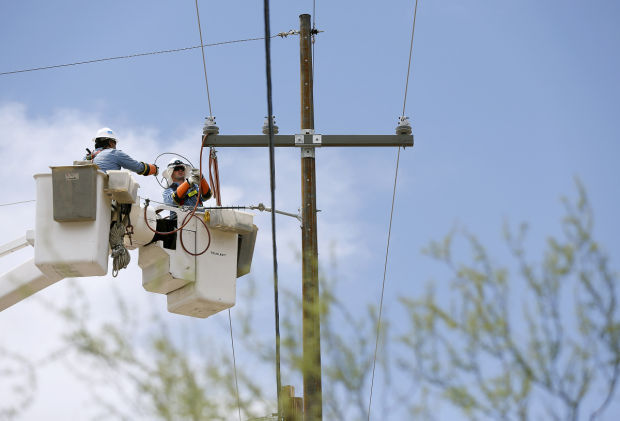PHOENIX — State utility regulators voted Thursday to immediately block electric companies under their purview from shutting off power to residential customers who do not pay their bills from June 1 through Oct. 15.
The 4-0 vote by the Arizona Corporation Commission requires utilities to give those who fall behind up to four months after Oct. 15 to repay the outstanding balance. And it bars the utilities from charging interest or late fees.
The emergency rules also say that any customer whose power has been shut off since June 1 must be immediately reconnected without any additional fees.
But the whole question of waiving additional charges bothered Commissioner Justin Olson.
“We may be actually creating an enticement to not pay one’s bill,” he said. “If one has other bills that will accrue interest and late fees, as most bills do, then there’s an enticement to delay paying this bill.”
He said that could make matters worse in the long run for some customers who might have been able to pay at least part of their summer electric bills but choose, in essence, to take the interest-free loan. And that, said Olson, creates a risk that some people will get in so deep that they will end up having problems bringing their account into balance by the following Feb. 15, resulting in them losing power at that time.
But Sandra Kennedy defended adding the no-fees language to the emergency order.
“I think what we have seen recently is a utility that has learned to beat the system,” she said. “So I’m offering this amendment so that this one utility is not allowed to charge late fees or interest on the dollars that are already delinquent.”
Kennedy never made a specific reference to Arizona Public Service, the state’s largest electric company.
It was that utility’s action last summer disconnecting the power of 72-year-old Stephanie Pullman after she had paid just $125 of her $176 bill that led to Thursday’s emergency rules. Pullman was found dead in her Sun City West home, with the death certificate saying she had preexisting conditions that were exacerbated by the temperature in her house.
Kennedy argued that eliminating extra fees gives customers a chance to catch up on what they owe.
But Kennedy, the lone Democrat on the ACC, said there’s a larger issue at work in why customers — 110,000 last year in APS territory alone — are being cut off in the first place.
“It’s a hardship because people can’t pay their bills,” she said. “It’s a hardship because the rates are too high.
“What do we do about that? We’ve been very silent on that.”
Olson was skeptical about the whole question of exempting past-due amounts for bills in the summer from interest and late fees. He pointed out there is no similar exemption for those who don’t pay their bills on time the rest of the year.
Kennedy, however, said the focus now should be on the immediate issue of utility customers whose health or lives could be in jeopardy if their power is shut off during the hottest months of the year.
“If we sit idle, and we sit silent, then we are just going along to get along,” she said.
The emergency rules also contain an additional provision designed to help customers avoid having their power cut off, not just during the summer but on a year-round basis.
It says if a utility has a deposit on hand, the company must first look to the deposit to make up anything owed. Then customers will get four months to bring the deposit back to where it was before.
The rules, adopted on an emergency basis, are good for up to 180 days, with the opportunity for regulators to renew them for another 180 days on top of that. Elijah Abinah, the commission’s utility director, said he hopes to have a final proposal for the panel to enact before next June.
There are a number of issues still left on the table that are likely to come up as regulators debate a permanent plan.
One is the desire by Kennedy to have the no-disconnect period start on May 1. The plan adopted on Thursday has June 1 as the beginning.
There also is some discussion about using weather forecasts and temperatures as a trigger rather than specific dates.
“That’s going to be an interesting discussion,” said Commissioner Boyd Dunn.
At least part of that question relates to concerns expressed in a letter to the commission from attorneys for the Navopache Electric Cooperative, seeking an exemption.
“Temperatures rarely, if ever, reach 100 degrees Fahrenheit within its service area,” the letter reads. “The justification for implementing the four-month moratorium on termination of residential services has no application to NEC.”
A similar complaint came from Mohave Electric Cooperative.
“Persons in the Bullhead area are used to and know how to handle temperatures that regularly are above 100 degrees,” the utility wrote to the commission. And it noted that during periods of high temperatures the city opens a cooling shelter for people, “whether or not they have utility service.”
And that company’s attorney argued that if Mohave Electric doesn’t get paid during the summer, it cannot pay its own bills.
Lea Marquez Peterson, newly appointed to the commission, was not present for Thursday’s discussion and vote. Instead, she provided a prerecorded video of her views for her colleagues listing some of the other things she believes need to be addressed as the regulators decide on a permanent rule.
One of those, she said, is requiring that there be “personal contact” with certain customers before actually cutting off power, including the ill, the elderly and the handicapped.
Pullman’s experience with APS was never far from the discussion.
“I could not imagine what the Pullman family have gone through, a tragedy that we need to address,” said Dunn.
“This is a tragic event that no family should have to endure,” said Olson.





